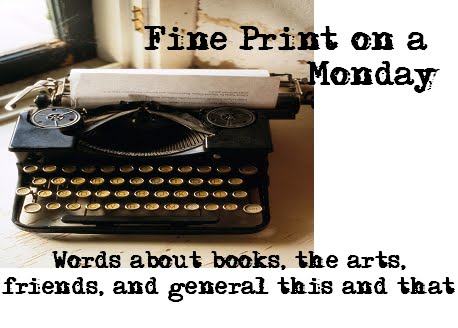What a striking cover.filled with peaceful images of life on the Sicilian coast. First we notice the intense blue of the water, then the rider on the Vespa. We get a glimpse of someone on a balcony above a simple, rustic church. Beautifully manicured hands hold what is most likely a glass of Prosecco . Finally, we see the rifle.
The hand belongs to sixty-year-old Auntie Poldi who recently moved from Germany to Sicily with the plan of drinking herself to death with an ocean view. The plan goes south when her handyman, Valentino, turns up missing, and eventually is found dead on the beach by, you guessed it, Poldi. Not one to be left out out of the excitement, Poldi abandons her plan to die, and throws herself full force, caftan and all, into the investigation. Warnings by the police to stay out of their business mean nothing to her; in fact, she manages to have several romantic interludes with the chief of police.
Poldi, based on the writer's real life aunt, mimics many likeable, stock characters. She's Auntie Mame - boho, extreme, flirtatious and overbearing. She's Father Brown, always turning up just minutes ahead of the official investigators, picking up pieces of evidence which she hides in her purse or somewhere in her billowing attire. Murder She Wrote and all the Miss Marple novels come to mind also. Throw in some Lucy Ricardo for laughs. That's not a bad thing. This is just a modern spin on that old favorite theme of the butt-in-ski amateur sleuth who may or may not manage to solve the crime.
The story's framework slows the novel down, in my opinion. Poldi tells her story to her wanna be novelist nephew who then relays the tale to us setting up two questionable, if not totally unreliable, narrators. However, the book entertains, especially when all of Poldi's Italian sisters-in-law gather for stakeouts, or to hear the lurid details of her nights of passion.
We learn about Sicilian culture and history. Amid the clever references to Sophocles and Aristophanes, Giordano alludes to the mythology surrounding the mafia.
Here's something I found surprising....
Here's something I found surprising....
"...coffee drinking in Italy is nothing like the activity portrayed in television commercials. It has nothing to do with coffee as a beverage, only with sugar. Coffee is merely a hot, aromatic, caffeinated liquid designed to dissolve sugar, so you don't need much of it. It can be small as long as it's strong...There's nothing more bizarre to a Sicilian than drinking an espresso without sugar."
Well, I'll have to give that a try. This book is the first in a series by Mario Giordano, translated from German by John Brownjohn.
Well, I'll have to give that a try. This book is the first in a series by Mario Giordano, translated from German by John Brownjohn.


No comments:
Post a Comment